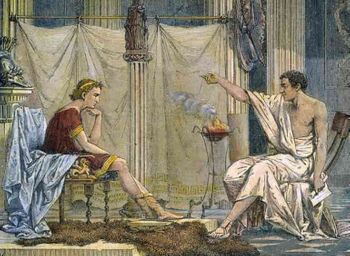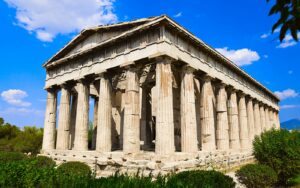Who is Hermias of Atarneus?

Hermias of Atarneus is one of the most interesting personalities in ancient Greece. He was a philosopher and logician who is best known for his Theory of Forms. In this theory, Hermias argued that there are universal forms underlying all material objects. Despite his fame, little is actually known about Hermias himself. This post will explore some of the lesser-known facts about him, including his life and work.
What is known about Hermias of Atarneus?
Hermias of Atarneus is one of the most famous ancient Athenian orators. He was born in Atarneus, in present-day Messenia, and studied at the Academy under Isocrates. As an orator, he specialized in public speaking and impassioned pleadings on behalf of the poor and underdog. His most famous speeches were delivered in defense of Meletus, a man who had been indicted for atheism by the city officials of Athens. Hermias’ eloquence was so impressive that the jury acquitted Meletus and declared him a free man.
After his victory in court, Hermias decided to stay in Athens and become a professional speaker. He quickly became one of the most popular speakers in Athens, often giving public speeches on behalf of people who could not afford to hire their own lawyers or pay for an audience with the city’s politicians. In 511 BC, Hermias was elected as one of the ten Atticarchs (the highest ranking magistrates in Athens) by the people of Athens. He served as an Atticarch until his death in 540 BC.
Hermias is best known for his speeches defending Meletus and arguing against atheism. But he also wrote several treatises on rhetoric and philosophy, including On Justice (which remains one of the most important texts on legal theory ever written), On Virtue (which discusses virtues such as courage, wisdom, and temperance),
Hermias’s Relationship with Socrates
Hermias is most commonly identified with the philosopher Socrates, who lived in Athens in the mid-fifth century BC. However, there is no evidence that Hermias and Socrates were ever friends or close associates. Indeed, it is likely that the two men never met.
Socrates was a deeply committed individual who believed in questioning accepted wisdom and exploring new possibilities. He was also known for his acerbic wit and his habit of challenging people’s views.
In fact, one of the charges brought against Socrates by his accusers was that he had corrupted young minds with his unorthodox thinking. It is possible that Hermias was one such victim.
Although little is known about Hermias himself, it is clear that he shared many of Socrates’ beliefs and values. For instance, both men were strongly opposed to traditional religious practices and belief systems. Instead, they argued for a more rational approach to life and believed that humans could discover knowledge through reason alone.
It is also worth mentioning that Hermias was a quite exceptional philosopher in his own right. In addition to developing some of the same ideas as Socrates, he also made significant contributions to philosophical discourse on ethics and aesthetics.
The Legacy of Hermias of Atarneus
Hermias of Atarneus is one of the most enigmatic figures in Greek antiquity. Little is known about his life, though he is thought to have been a statesman and philosopher who lived in the 6th century BC. He is best known for his philosophical work, which focused on ethics and epistemology. However, what makes Hermias interesting is not just his philosophical work, but also his legacy.
Hermias was very much admired by his contemporaries, and many of his teachings are still influential today. For example, he was one of the first thinkers to espouse the idea that knowledge can be acquired through reason alone rather than through tradition or revelation. Additionally, he argued that ethics should be based on reason and self-interest rather than on religious beliefs. These ideas have had a significant impact on ethical debate throughout history, and are still highly relevant today.
Overall, Hermias represents an important figure in Greek philosophy and ethics. His teachings continue to be debated and discussed centuries after his death, making him an enduring figure in the history of thought.
You may also like;
- Who Is Noam Chomsky?
- What You Need To Know About The Sikh Religion
- The Hanging Gardens Of Babylon Real Images
- What Is The Literary Definition Of Setting?
- Who is Saint Jude Thaddaeus
Frequently Asked Questions on Who is Hermias of Atarneus?
What are the major works attributed to Hermias?
Hermias of Atarneus is one of the most important thinkers in ancient Greece. He is known for his work on ethics, which is still widely studied today. His writings have influenced thinkers throughout history, including Aristotle and Plato.
Some of Hermias’s most famous works are On Ethics, On Nature, and On Friendship. In these texts, he discusses the importance of ethics, nature, and friendship. He also argues that each person should approach life with a sense of responsibility and compassion.
Hermias was a highly influential thinker who has had a lasting impact on philosophy and ethics. His ideas continue to be studied and debated by philosophers today.
Why is Hermias considered one of the greatest ancient philosophers?
Hermias of Atarneus is one of the most well-known ancient philosophers. He was considered one of the great thinkers of his time, and his teachings have influenced many other philosophers over the centuries. Some of his famous ideas include the theory that every thing has a nature, and that knowledge is universal.
He was also known for his philosophical debates with other philosophers, which are said to have been some of the most important in ancient Greece. Despite his fame, very little is known about Hermias’ life or motivations for writing philosophic texts.
Who is Hermias to Aristotle?
Hermias of Atarneus is often considered the father of Greek philosophy and Aristotle’s father in law.
Conclusion
Hermias of Atarneus is a figure who has been largely forgotten by history, but he was an influential philosopher and teacher during the Golden Age of Peripatetic Philosophy. He is most well-known for his work on logic, but he also wrote on ethics, physics, mathematics, and other topics. If you are interested in learning more about Hermias of Atarneus or in exploring some of the issues he addressed, I recommend reading some of the articles available online.
Last Updated 3 years by










